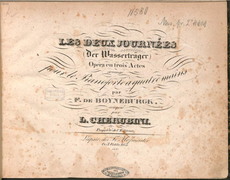The Many Lives of Baron Friedrich von Boyneburgk
Klaus Rettinghaus
Thursday, August 29, 2019

We were very pleased to receive this post from Klaus Rettinghaus (Leipzig). The RISM data have since been revised. The changes will be visible after the next update of the RISM catalog.
Authority data can be a big help in finding materials related to specific entities, usually individuals. This is especially true with the people in the RISM catalog because pre-19th-century individuals in particular have many name variants that can cause confusion. The variants have in part arisen because names of composers appear with Latin, Italian, or even French spellings, and partly also because in recent times overeager librarians and researchers have added to the already diverse historical spellings. But it can of course also lead to problems if people are not clearly identified.
Let us consider Friedrich von Boyneburgk, who in the 19th century was regarded as a “very productive composer, refined piano player, and good clarinetist” (Hermann Mendel, Musikalisches Conversations-Lexikon, 1872, p. 161). The entry in Schilling’s Encyclopädie der gesammten musikalischen Wissenschaften lists some of his works (p. 739 ff.), but unfortunately does not give us a date of birth or death. Ulrich Leisinger is the one who first connected this person to Baron Carl Friedrich von Boyneburgk (1779-1854; Die Bach-Quellen der Forschungs- und Landesbibliothek Gotha, p. 22). This is supported by Boyneburgk’s composition studies and the letters to him from his teacher Karl Gottlieb Umbreit, which are preserved as part of the Gorke Collection in the Bach-Archiv Leipzig.
Boyneburgk became famous for his variations and four-handed piano arrangements of operas. His printed works reveal a variety of names that is pleasingly small in number. Only rarely does his first name appear—if at all, then in the French form “Charles,” and then occasionally his last name is adapted to “Boynebourgk.” Here and there the aristocratic title “Baron” is also given. In the handwritten sources listed in the RISM catalog, the situation is even less complicated, so that there ought to be no problems with the name.
Nevertheless, four different entries for Boyneburgk have accumulated in the RISM catalog (pe30000457, pe30000458, pe30019201 and pe30091347). In the German National Library’s authority file (DNB), there are even five. (Two records are based on cataloged materials in the Herzog August Bibliothek and the Staatsbibliothek zu Berlin). Since RISM contributes its authority files for personal names to VIAF, as do other institutions, there are no less than eleven different records there for Friedrich von Boyneburgk.
What can be done about this mess? One thing you can do is point out the fragmentation to the data providers. In the DNB catalog, you can report an error on the right-hand side of the page for the name. (If you go this route, you will rarely receive a response.) However, since there are several duplicates in our case, a more targeted approach is recommended. For more than ten years, Wikipedia has been collecting errors in GND personal name authorities and reporting them to the GND editors. This partnership works very well; the process is visible and traceable in a public forum, and the GND editorial team also documents the changes and gives a response. To get the process going, I first created a new entry in Wikidata to collect all the facts, and then wrote a short article on Friedrich von Boyneburgk. Finally, I reported the error. Now we just have to sit back and wait, because it can easily take a year and a half until the record is corrected in the GND.
Meanwhile, RISM’s series A/I has three arrangements by Friedrich von Boyneburgk that were published in undated editions:
- RR 2439a (published 1829 according to Hofmeister)
- M 1942 (published 1831 according to Hofmeister)
- CC 2028 I,143 (published 1829 according to Hofmeister)
Images: Title page from Cherubini’s Wasserträger, arranged by Boyneburgk (CC 2028 I,143). Availabile online from D-Mbs 2 Mus.pr. 4404.
(not in RISM) GB-Lbl E.824. Shakespeare’s Lieder, mit Begleitung des Piano-Forté … Erste (zweite) Lieferung 16tes. Werk, Offenbach a/M , J. André, ca. 1830.
Share Tweet EmailCategory: New at RISM

